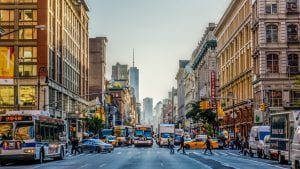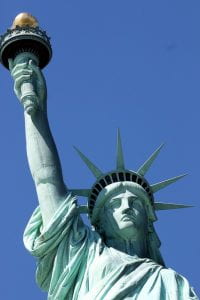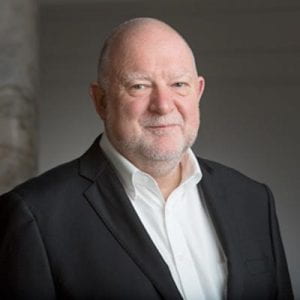In anticipation for the 7th ENCATC Academy on Cultural Diplomacy: “The Rising Role of Cities” from 15-16 February 2018 in New York City, we sat down with Gerald Lidstone, Director of the Institute for Creative and Cultural Entrepreneurship at Goldsmiths, University of London. As a leading expert in culture in external relations, we talked about the focus of the 2018 Academy and why this is a unique and important learning opportunity for ENCATC members and participants.

Photo “New York City” by Jeff Turner via Flickr, CC BY 2.0
Why this Academy’s focus on “The Rising Role of Cities”? What unique roles do cities have to play in cultural diplomacy?
In Europe, cities were the initial drivers of diplomacy as many were city states before they were countries. In the United States, big cities command a lot of practical power, economically and diplomatically. Cities have always harnessed the power of commercial culture, mature ones like Milan for fashion and Hollywood for film.
Within Europe there are the European Capitals of Culture that benefit from the funding and structure of this EU initiative developed in 1985 and has, at date, been awarded to more than 50 cities across the European Union. These cities are able to invest in placemaking, creation, and promotion of their identities and branding.
However, for many cities, there is still a great need for cooperation between public authorities and creatives. Structural support and financing can stimulate creative industries and hubs that can launch and/or propel a city’s brand and cultural image to the world stage. In the United States it is also interesting to see stories of turn- around, regeneration, and re- establishment, stories of cities like Detroit.
Why are you excited to have the ENCATC Academy in the United States for the first time? By having it in New York City what new components and opportunities will this bring to the Academy and its participants?
Running the ENCATC Academy outside of Europe is going to bring a very new perspective. The United States has always been a strong player in global diplomacy. It is one of the first countries to articulate the power of diplomacy and role culture can play.
Participants are going to gain first- hand experience of the US perspective. In designing the Academy’s programme, one of our roles will also be to articulate from the European perspective and how Europe is not a solid entity, but a very disparate collection of countries each with their own agenda. There will be an area of interest looking at the different states in America and their cities, each with their own agendas as well. We’ll be listening to many voices and narratives.

Photo “Close up Statue of Liberty” by Prayitno via Flickr, CC BY 2.0
Of course being in New York we are in a prime physical location to talk about key topics. Furthermore, collaborating with our fellow ENCATC member New York University we will pool knowledge and expertise on the rising role of cities in culture and diplomacy. The combination of experts, academics esearchers and practitioners from Europe and the United States will be an invaluable asset to this learning opportunity and enrich our discussions and exchanges.
Also in an Academy first, we are linked to the 7th ENCATC International Study Tour taking place in New York City from 12-14 February. For Academy participants also attending the Study Tour, they will get behind- the-scenes visits to arts and cultural institutions in this iconic city that has such an undeniable presence and role in international cultural diplomacy. Moreover, as many of the Study Tour participants will also attend the Academy, this will allow participants to get to know each other before we delve into the presentations, lectures and talks in the Academy framework.
Why should academics, researchers, cultural managers, practitioners, artists, and policy makers working at all levels (not just local, but regional, national, and international) be concerned by the rising role of cities in cultural diplomacy?
I think the value for all of these profiles is hearing the narrative of how perceptions of cities, countries and cultures are made outside of the international communications which come through press, cultural products and television – especially television. For example, each week in Europe people watch infinitely more hours of series produced by HBO and Netflix that have images and narratives of cities and culture than they do watching the news. During the Academy, we will also understand the role of commercial organisations and independent media to create the images of countries and cities. These often have much greater impact on cultural diplomacy than official or national initiatives from governments which tend to underestimate the power commercial interventions have in different countries.
Also, with the rise of fake news and as some politicians try to communicate with the world through Twitter, this phenomenon is very relevant to our debate. It brings up issues of international trust and who is relevant to speak for communities. Who we now believe is becoming increasingly important.
In the design of the Academy’s intensive learning programme in 2018, what makes it unique from other learning formats on culture in external relations?
The ENCATC Academies are different from other learning programmes because they are very interactive. We provide the environment, atmosphere and programming that makes it possible to have real dialogue and for all participants to make contributions. By the end of the Academy we will have had very enriching discussions amongst a diverse group of individuals bringing many perspectives and insights.
This matters because there are no “right answers” in cultural and external relations and its complex and interconnected ties to economic, social, political and environmental strands.
I do want to stress that while these will be high-level discussions there is an important and very valuable opportunity here to gain insights for people with interest in this area, but who have yet to accumulate a lot of experience in it.
All participants will come away with new and stimulating knowledge, perspectives, practical examples, cases, testimonials, and narratives that will ignite a desire to continue the discussion and learning.
Finally, what also sets ENCATC’s Academies apart are their success to attract a very diverse audience from many countries, professional disciplines and areas of interest under the wide umbrella of cultural diplomacy. For the participants this means establishing new professional connections with others who share the same interests but whose paths do not cross in their respective professional spheres.
Register to the ENCATC Academy on Cultural Diplomacy: “The Rising Role of Cities” (15-16 February 2018):
www.encatc.org/en/events/detail/encatc-academy-on-cultural-relations-and-diplomacy-the-rising role-of-cities/
Register to the 7th ENCATC International Study Tour to New York City (12-14 February 2018):
www.encatc.org/en/events/detail/7th-encatc-international-study-tour-to-nyc/
 Gerald Lidstone, BA MA ATC Dr.h.c FRGS is the Director of the Institute for Creative and Cultural Entrepreneurship at Goldsmiths, University of London and founder of the MA Arts Administration and Cultural Policy and co-founder of the MA in Creative and Cultural Entrepreneurship programme and the MA in Cultural Policy, Relations and Diplomacy, the first worldwide. For the British Council and other agencies he has also taught Arts Management courses including, Arts Marketing, Arts Education, Fundraising, Copyright and Strategic Planning in over 20 countries. He has worked for over twelve years on behalf of The Ministry of Culture and Information in Viet Nam establishing Arts Management education in Hanoi University of Culture, funded by the Ford Foundation, well as being awarded the national medal for culture in Viet Nam. He was also the director of a four-year British Know-How Fund (Foreign Office) project establishing arts management education in Slovakia. Read his full biography here:
Gerald Lidstone, BA MA ATC Dr.h.c FRGS is the Director of the Institute for Creative and Cultural Entrepreneurship at Goldsmiths, University of London and founder of the MA Arts Administration and Cultural Policy and co-founder of the MA in Creative and Cultural Entrepreneurship programme and the MA in Cultural Policy, Relations and Diplomacy, the first worldwide. For the British Council and other agencies he has also taught Arts Management courses including, Arts Marketing, Arts Education, Fundraising, Copyright and Strategic Planning in over 20 countries. He has worked for over twelve years on behalf of The Ministry of Culture and Information in Viet Nam establishing Arts Management education in Hanoi University of Culture, funded by the Ford Foundation, well as being awarded the national medal for culture in Viet Nam. He was also the director of a four-year British Know-How Fund (Foreign Office) project establishing arts management education in Slovakia. Read his full biography here:
www.encatc.org/media/2845-new_york_speaker_biographies.pdf
Published in ENCATC News N°113.